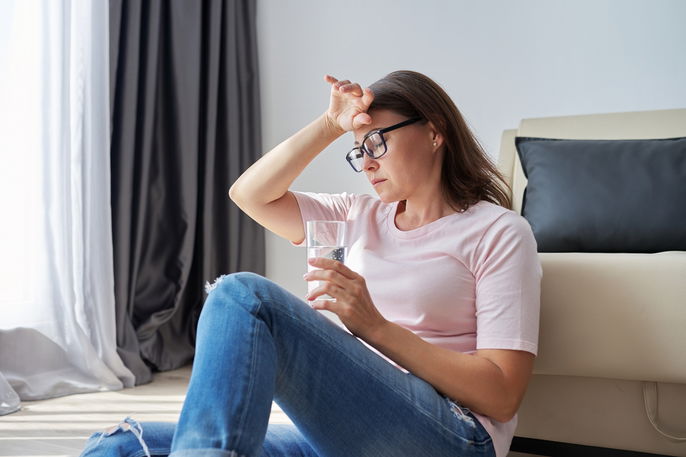Early menopause is characterized by menopause that occurs before the age of 40. This condition is associated with decreased ovarian activity, which interferes with the fertility and leads to the appearance of typical menopause symptoms, like hot flashes, irregular periods, decreased libido and hair loss.
In the initial phase of early menopause, the ovaries will start to age, but symptoms will not be notable and some women may continue to menstruate.
However, as hormone production gradually decreases in the ovaries, symptoms will start to emerge. It is important to see a gynecologist if notice symptoms of menopause. The doctor can order testing to confirm a diagnosis and start treatment as needed.

Common symptoms
The main symptoms of early menopause are:
Irregular menstrual cycles, with long intervals between periods or a complete absence of menstruation;
- Hot flashes with no apparent cause
- Excessive sweating, especially at night
- Frequent mood swings
- Vaginal dryness
- Decreased libido
- Hair loss
- Difficulty sleeping and poor sleep quality
Symptoms of early menopause appear will appear before the age of 40 and are similar to those of regular menopause. However, they may be felt more intensely due to the sudden interruption of sex hormone production. Read more about the symptoms of menopause and how they can be managed.
Online symptom checker
If you think you may be experiencing signs of early menopause, report your symptoms below to determine your risk:
Please note that this symptom test is only a guidance tool, and does not replace an assessment or diagnosis made by a gynecologist.
Confirming a diagnosis
An early menopause diagnosis should be confirmed by a gynecologist, who will start by assessing the regularity of your menstrual cycle or determining if it has terminated indefinitely. The doctor will also older blood tests to evaluate the levels of hormones like FSH, estradiol and prolactin. Since a lack of a period may also be a sign of pregnancy, the doctor may also order a pregnancy test.
Also recommended: Cramps But No Period: 8 Common Causes (& What To Do) tuasaude.com/en/cramps-but-no-periodThe doctor may also order genetic testing and imaging tests, such as pelvic and transvaginal ultrasounds to assess the woman's reproductive system.
Common causes
The main causes of early menopause are:
- Genetic alterations in the X chromosome
- Family history of early menopause
- Autoimmune diseases
- Enzyme deficiencies, such as Galactosemia, which is a genetic disease characterized by low levels pf galactose enzymes
- Chemotherapy and excessive exposure to radiation or to certain toxins like those found in cigarettes or pesticides
- Infectious diseases, such as mumps, Shigella sp. infection and malaria, although these causes are rarer
Surgical removal of the ovaries, inflammatory pelvic disease or endometriosis can also cause early menopause in women, as these conditions interfere with estrogen production in the ovaries.
Treatment options
Treatment for early menopause usually involves hormone replacement therapy with estrogen or progesterone + estrogen combination medications, which can help relieve symptoms related to low estrogen levels. These medications can also help to maintain bone mass and prevent the onset of diseases such as osteoporosis.
Treatment can also be complemented by regular physical activity and a balanced diet, which should include whole foods, seeds and soy products, which play a role in regulating hormones.






























